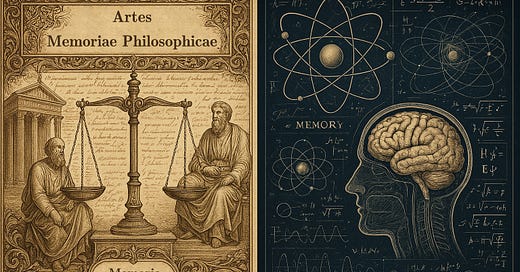Memorize for Meaning
A course for taking back our minds by easily remembering life-changing ideas
"Memory is an indescribable good; for this reason, human skill cannot find the necessary words of praise to extol it; for he who remembers well, by either natural or artificial means, gleams like the sun and, like light in the darkness, provides brightness."
— Boncompagno da Signa, On Memory, 1230 A.D.
Introduction | An Antidote For The Phone Age | Approach | Cost | Course Index
Memorize for Meaning
What we memorize doesn’t sit in our brains like gold bars in a vault.
It can change us, and this is why ancient philosophers, medieval theologians, and Renaissance thinkers of very different ideologies spoke glowingingly of the ars memoriae.
Their arguments for practicing mnemonic techniques break down along a few lines:
It’s useful to have certain ideas on hand and not have to consult books or authorities. This make us more effective thinkers, leaders, and problem solvers. Most of all, these ideas help us do.
Some ideas enable “the good life,” if we make them part of us and our everyday operating system. Stoic philosophers, for instance, constantly asked learners to remember certain precepts so they could enact them in their lives. Ancient Christians had a similar line of argument. But it’s the same with self-help; ingraining positive habits and reframes for hard things is much easier when we’ve made them a part of us. To remember is to be. Or maybe we can’t be without remembrance.
Curatation of the mind through mnemonics can be a surprisingly enjoyable and rewarding experience (surprising for me, at least — I always hated memorizing). Renaissance practitioners describe blissful states that incentivized their memory practice in terms normally reserved for religious experiences.
Renaissance writers — like Giordano Bruno and Robert Fludd — leaned into Hermeticism and Neoplatonism to explain this pleasure. I don’t know enough about those topics to have an opinion.
I prefer to avoid hyperbole, but “ineffible” is the word I’d go with to describe my experiences with the memory arts. I can cite studies on dopamine release during memorization, brain scans that show grey matter growing and neuronal connections forming, and much else. But I don’t have a unified theory of why the memory arts feel so good.
But when I’m practicing for just a few minutes a day:
My mind feels more capable, creative, and perceptive, like something turns on that’s normally turned off. I make more connections between things I encounter and what’s stored in my mind. In other words, the ideas have sex and my mind churns out idea babies.
Everything seems to have more meaning and context. There are more things in my memory to bring this context and meaning, of course, but the other side is that I’m somehow more aware of the context than I would be via knowing things through other forms of learning.
I often enter pleasurable flow states while practicing.
The more I practice the memory arts, the more I think there’s something weird —in a good way —about them. They seem self-evidently excellent to me, but I can’t explain why. It’s one of the most gratifying uses I’ve found for a nightly internet void.
An Antidote For the Phone Age:
"All men by nature desire to know." — Aristotle, Metaphysics, 1.1
People increasingly neglect memory because they figure Google or Chat GPT can supply them with missing knowledge.
I doubt that’s entirely true, since it adds friction and additional steps to utilizing anything. To look up is not to know, it’s to wield without context. It’s renting vs owning. But assuming it’s true, the argument doesn’t account for the loss of being a fully realized, capable, agentic human. It doesn’t grapple with the second and third argument for memory training the ancients brought to bear.
Aristotle famously insisted that humanity is wrapped up in a drive to understand. He didn’t suggest looking up and immediately forgetting was the characteristically human thing. He thought we wanted to build idea latticeworks to help contextualize reality and discover meaning.
Aboriginal tribes have relied on image and location-based mnemonic techniques since prehistory, and the Greeks and Romans — and the Renaissance polymaths that followed — applied these ideas to business, philosophy, and their political lives. We were wired to memorize from the very beginning, but the modern world doesn’t teach us how.
Many modern humans have given up on memory, trading it away for a shallow, stimulating existence free of context. The internet is breaking us as it uplifts us with unlimited knowledge, enjoyable entertainment, and the promise that we’ll never have to remember anything ever again.
You’ve seen the studies. Our attention spans, reading abilities, logical reasoning, and other faculties are declining among people of all ages. Depression and anxiety are rising. Things are not going well for humanity.
Taking back our mind through these ancient practices can help us reclaim agency and meaning as modernity upends what it is to be a functional human.
The Memorize For Meaning Approach:
I don’t want you to become a memory savant, working on memory palaces for hours a day. I’m no memory “athlete”, and have no desire to be. My own memory accomplishments are modest, and I’m only creating this course because I think it addresses a weird blind spot society has and a real need for self-actualization and getting humanity out of this rut.
My goal is to teach simple tools that can help us live better lives with relatively modest outlays of time. Redirecting 10-15 minutes from internet time, 5 days a week, can make a huge difference. If you periodically find an hour to really dial in your focus, all the better.
What will you make a part of you? That’s the best part — you get to decide. Build the latticework of ideas that your curiosity, spirituality, morals, and logic demand of you.
But I do have some suggestions if you’re looking for guidance. Most people don’t have personal operating systems to guide them through life, and I’m a big fan of integrating that into ourselves via the mnemonic arts. Practical philosophy is really useful, so we’ll explore how to memorize the useful bits and make it part of us.
I’ve built this course around a minimum-viable product approach. The initial tranche of articles will be valuable by themselves, but if readers respond positviely, I’m interested in expanding it.
Cost
This is the first major piece of writing I’ve created which will be — in part — for paid subscribers only.
However, I recognize that not everyone can afford to pay. My stats page tells me I have multiple subscribers from countries in economic turmoil, and even those in the developed world may have limited means.
I don’t want inability to pay my $50 yearly subscription fee to hold someone back from what I consider to be really valuable material.
If you fall into that category, shoot me a message, let me know what you can afford to pay, and I’ll arrange a discount. I imagine most people can pay something, but if you can’t afford $1, we’ll work it out.
If you’d like to access the full course, please subscribe, which also subsidizes the rest of my writing, which I keep free for everyone.
Course Index
The Link Method:
A crash course on using the link method to easily remember information for a lifetime.
Easily Memorize All of Stoicism
Easily memorize the 53 precepts that Arrian — a Stoic philosopher, polymath, explorer, general, author, imperial confidant, and governor — considered critical for living the good life and being active and effective in our world. This is a battle-tested personal operating system you can have on hand at all times.
What Our AI Is Costing Us
How AI diminishes our memory, critical thinking skills, and and ability to navigate the world.
How the Ancient Stoics used memory techniques.
Upcoming in 2025
Using memory palaces and memory towns.
Memorize for Meaning Discussion Group:
Thanks for reading Socratic State of Mind.
If you liked this article, please like and share it, which helps more readers find my work.









Great post !!! again ... 👍👍👍 🔥🔥🔥
{...Most people don’t have personal operating systems to guide them through life...}
This is the most distressing sentence I read today ...
But no surprise when seeing how family-life with 2-3 generations living under one roof are being systematically destroyed ...
The internet is just a library at home with 24/7 access-hrs.
You are what your memory is ...
People w/o memory are living dead;
just perfect to be manipulated by a history that is being re-written 24/7 ...
Fascinating - inspired me to start memorizing the quotes I’ve captured in my wisdom commonplace book.